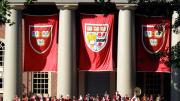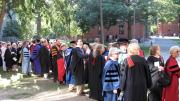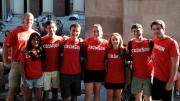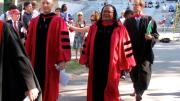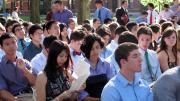In a Freshman Convocation with a twist, the class of 2015 was welcomed by President Drew Faust, dean of Harvard College Evelynn M. Hammonds, and others, and then introduced to an innovation: the Freshman Pledge.
Telling the first-years that their arrival on campus is “no longer about where you’ve been, or even about where you are now, but about where you are going,” President Faust urged students in her convocation address to embrace their natural feelings of uncertainty and step out—even far out—of their normal comfort zones.
“A key part of any success is the part of you willing to fail,” Faust told the 1,6oo-plus incoming freshmen seated in front of Memorial Church under a clear blue sky Tuesday. “This is the most important message I can convey to you as you begin your time here. For it bears not on just how you will define success during the next four years, but on what it means to be a successful human being.”
Faust recalled her own convocation at Bryn Mawr, and the words of wisdom from her former college president, Katharine E. McBride, that remain firmly implanted in her memory: “The path to learning is humility.”
“I would go a step further and say this is why you, chosen from a pool of almost 35,000, are here,” Faust said:
Not just because you passed through the eye of some academic needle, but because you already have the capacity for this kind of humility—a capacity for taking risks.
Harvard probably felt like a very safe choice when you were deciding where to spend your undergraduate years. As one undergrad put it: “a personal insurance policy for success.” But I want you to know that Harvard is safe for a different reason: for next four years we are here to help you leave your comfort zones.
Dean of the College Evelynn M. Hammonds, Rosenkrantz professor of the history of science and of African and African American studies, asked freshmen to respect one another’s opinions, even the most surprising ones, as they figure out how to bond as classmates, saying, “It is here that you will meet collaborators, challengers, and most important of all, friends.”
“This will be your community for four years,” Hammonds said. “A community that will strongly affect who you are, what kind of person you will be, and what you do for the rest of your lives. It is a community that will shape you, and be shaped by you. And it is now time to ask, what kind of community do you want to build for yourselves?”
Student speaker Ekene Obi-Okoye '12 shared a rousing poem about tutoring a nine-year-old boy in Boston's South End and being a member of the Kuumba Singers, two experiences, she said, that truly embody her Harvard journey. “Fingers shifting, chest lifting/Soundless, he is, but his eyes tell you a different story,” she recited. “Please don’t take my quietness for weakness./Don’t take my silence for disinterest./I am built to be strong, to defy and to prove all others wrong.”
Faust encouraged students to “combine things, experiment,” noting that broad exploration and deep immersion are passions that often fuel one another: “Whenever you feel self-conscious or uneasy, remember, initial ignorance can be a great asset. The most learning happens when you are able to make mistakes and see where they lead you.”
To conclude the ceremony, Harvard Alumni Association president Ellen Gordon Reeves ’83, Ed.M. '86 encouraged the freshmen to fully immerse themselves in their Harvard experience, and led them in singing “Fair Harvard” before dean of freshmen Thomas Dingman offered closing remarks. Telling the class that they will quickly discover “the many aspects of the past carried into the future in this venerable place,” he reminded them that it’s all right to reinvent their new school, as some have already done by signing the Class of 2015 Freshman Pledge.
The new pledge, intended to be a “visual reminder” of student values, Dingman said, calls for students “to act with integrity, respect, and industry, and to sustain a community characterized by inclusiveness and civility,” and above all, “kindness.”
It reads:
At Commencement, the Dean of Harvard College announces to the President, Fellows, and Overseers that "each degree candidate stands ready to advance knowledge, to promote understanding, and to serve society." That message serves as a kind of moral compass for the education Harvard College imparts. In the classroom, in extracurricular endeavors, and in the Yard and Houses, students are expected to act with integrity, respect, and industry, and to sustain a community characterized by inclusiveness and civility.
As we begin at Harvard, we commit to upholding the values of the College and to making the entryway and Yard a place where all can thrive and where the exercise of kindness holds a place on a par with intellectual attainment.
The pledge was created, Dingman said in a subsequent interview, after conversations with administrators and students about the need for reaffirming institutional values and conduct on campus. Students are free to sign it if they wish, but are under no obligation to do so; Dingman said forcing students to sign would “be against the very nature of the pledge.”
It remains to be seen how many freshmen will sign on. (School officials said they will soon release the number of initial signers.) Some faculty members have expressed reservations, including Harry Lewis, McKay professor of computer science and former dean of Harvard College, who wrote in a blog post that the document, although noble in cause, “sets a terrible precedent” for Harvard, which “has a deep and ancient antipathy to pledges and oaths.” He is also critical of the pledge because copies will be displayed in the entryways of freshman dormitories, and those copies will list the name of every freshman in the entryway, alongside a space for his or her signature. “Nonconformists would have good reason to fear that they will be singled out for extra scrutiny. And their unsigned signature lines are hung for all to see,” Lewis wrote.
For some undergraduate reaction to the new pledge, read the Crimson's coverage.
